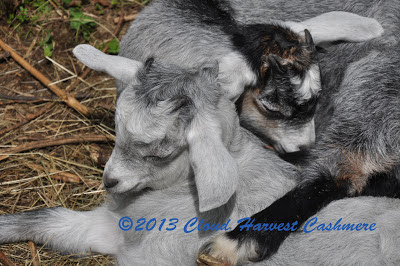It was chilly when I went outside for morning chores today; 0°F (-18°C), but the wind had dropped, so it was really very pleasant. Last night it was bitter and blowing, but when I did a final check on water buckets, I found the goats had chosen to remain in the paddock with open-ended shelters rather than move into the snug barn.
There is much to be said for cashmere underwear!
~~~
So, the goats are fine with the cold. And the hens? They have feathers, yes, but they spend their waking hours awfully close to frozen ground. And they are barefoot! Still, nothing stops them in their busy puttering and muttering. If the snow is deep, they follow my tracks to the goat barn or the paddock. In fact, they seem to take Winter right in stride.
Some chicken-owners say their hens will not step foot out of the coop if there is snow on the ground. My hens must be made of sterner stuff, or else they have places to go and are willing to face some snow to get to those places, I don't know.
Certainly they have their own little universe going on out there. During the day I will suddenly discover them scratching through the bedding in the goat barn. Or I look out the window to see them trundling along single-file toward the paddock, where they have a secret clubhouse under my workshop.
Really, I have no idea what goes on under there.
There is about 14 inches between the ground and the floorboards of the workshop. I am no longer limber enough to get bellydown on the ground without a very good reason. Crashing the Secret Chicken Clubhouse to find out what they are doing down there is not a very good reason.
~~~
One thing I know for sure they are not doing: scratching and pecking for bugs and fresh bits of greenery. Because there just aren't any.
For about 7 months of the year, these hens supplement their diet (fresh water, organic layer pellets, organic barley, organic kitchen scraps) with no help from me. All day long they are free to wander within a vast (on a chicken scale) fenced area, and except for the time they spend snoozing in the sun, they are endlessly scratching and pecking, scratching and pecking.
Now the earth is frozen solid. The only hen-level "greenery" looks like this:
Not a lot of "green" to glean. Hmmmm....I have an idea!
Hey chooks! Who wants sprouts?
"I do! But only me, none of the other hens care for any sprouts.
So stop shouting about sprouts!
Meet me behind the Poultry Palace in 5 minutes. Bring the sprouts!"
~~~
I've been sprouting green lentils for the hens this winter, and find it's a simple way to provide a little fresh greenery at minimal expense or effort.
Maybe you'd like to try it too? Here's what I've been doing.
Start with ~1/8 cup dried green lentils in a quart Mason jar. Cover the lentils with water to soak overnight. Add a lid that will keep the lentils in but let water flow through.
In the past I've used cheesecloth and a canning ring, but now I use a rubberband and a scrap of the rubbery stuff that keeps scatter rugs from sliding or glasses from getting broken in the cupboard. The bigger holes make rinsing and draining the mason jars a snap!
After soaking overnight, drain. Rinse and drain daily, and keep the jar in a darkish place til the roots appear.
Once the roots are growing, rinse and drain several times daily, gently shaking the sprouts apart if they are clumping together. Keep the jar in a place that gets some sunlight.
Here's what they look like when the roots and the stems are growing and first leafy growth is beginning; perhaps 3 days. The whole jar takes on a greenish hue.
At this point, my hens will eat them but I like to wait til they are a couple of days older, with more lovely green. I've been starting a fresh jar every other day, for an overlapping and steady supply. If I overdo it and have a surplus, I'll store the extra sprouts in the fridge - so far, that hasn't happened.
This isn't a big component of my hens' diet. I want them to eat it all right up, and I want everyone to have a share. One big handful, well scattered, has been working out nicely every day.
~~~
I've experimented with a couple of other types of seed, but have not been impressed with the results.
I wanted to try a monocot, because the hens eat a lot of grasses in the summertime. This is organic barley, same volume of seed, started at the same time as the lentils above. The barley was sprouting, but slowly, and I felt concerned about the possibility of mold or bacteria that might be harmful to the hens.
I also tried some flax seeds, with a similar result.
I don't know if there is a real risk of mold/bacteria, but don't care to take a chance, especially when the lentils are so easy.
I'll continue to try other kinds of seeds, though, when I have other organics available.
~~~
Do you raise sprouts for your hens? Or for other critters, such as yourself? Please add your input in the comments, or send me an email! This is the first season I've experimented with sprouting for the chooks, and I'd love to learn from others' experiences!
~~~
A loud THUNK just made me jump! Happily, it was not a(nother) big branch falling on the house. It was a 12"-wide column of solid ice sliding out of a waterbucket that has been upended in the shower since this morning. Tonight is predicted to be about 10 degrees colder than last night. Good thing I have lots of water buckets in rotation!
~~~~~




























